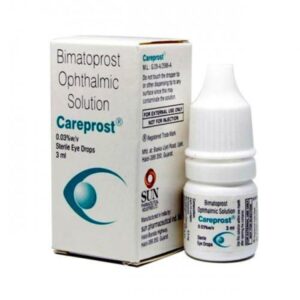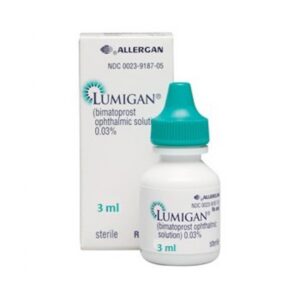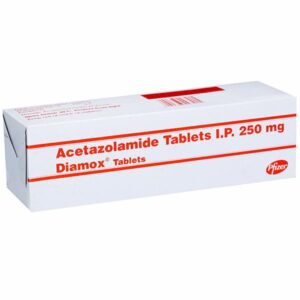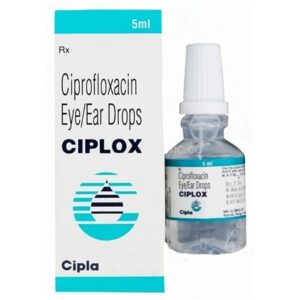Lumigan 0.01%
Lumigan 0.01% contains bimatoprost, an ocular medicine used to treat raised/increased eye pressure. Glaucoma is a condition that can result from it. Lumigan 0.01% can be used alone or with additional medications. Glaucoma is an eye illness caused by damage to the optic nerve. This injured nerve causes an unnatural increase in ocular pressure.
Lumigan 0.01% includes the prostaglandin analogue Bimatoprost. It is primarily used to treat excessive intraocular pressure. It works by boosting aqueous humor (fluid in the eye) production and lowering ocular pressure. As a result of the increased pressure, glaucoma might develop. If the pressure is too great, it can cause vision loss. Lumigan 0.01% should only be used in the infected eye and should not come into touch with the healthy eye.
Lumigan 0.01% are only to be used externally. To avoid infection, burst the seal and wash your hands before using it. If you wear contact lenses, remove them before using Lumigan 0.01% , and then replace them 15 minutes later. In some circumstances, you may feel eye irritation and conjunctival hyperemia (eye inflammation). The majority of these Lumigan 0.01% adverse effects are transient, do not require medical treatment, and fade away with time. However, if the negative effects do not go away, consult your doctor.
Only use Lumigan 0.01% if your doctor has prescribed it. Never encourage self-medication or propose that someone else take your medicines. Stopping Bimat Ocular Drops 3 ml abruptly can cause an increase in eye pressure. If you are allergic to sulphonamides or have severe kidney or liver illness, do not use Lumigan 0.01% . If you have dry eyes or a cornea condition, consult your doctor before starting Lumigan 0.01% . Furthermore, Lumigan 0.01% does not cease abruptly, since this may cause serious negative effects. Without contacting your doctor, do not use Lumigan 0.01% with any other eye medicine.
Lumigan 0.01% are used to treat glaucoma and ocular hypertension (increased eye pressure)

Medicinal Advantages
Lumigan 0.01% includes the prostaglandin analogue Bimatoprost. It is primarily used to treat excessive intraocular pressure. It works by boosting aqueous humor (fluid in the eye) production and lowering ocular pressure. As a result of the increased pressure, glaucoma might develop. If the pressure is too great, it can cause vision loss. Lumigan 0.01% should only be used in the infected eye and should not come into touch with the healthy eye.
Use Instructions
Bimat Eye Drops (Bimat Eye Drops) 3 ml ophthalmic comes as a liquid solution to be injected into the eye. It is usually injected once a day, at night, into the afflicted eye(s). Attempt to take the medication at the same time each day. Follow the directions on your prescription label carefully, and if you have any questions, ask your doctor to explain anything you don’t understand. Lumigan 0.01% should be used as indicated. Do not take more or less of it, or use it more frequently than your doctor suggests.
Store in a cool, dry location away from direct sunlight.
Lumigan 0.01% Side Effects
Lumigan 0.01% , like all drugs, can produce side effects, though not everyone experiences them. Eye itching, conjunctival hyperemia (eye inflammation), dry eyes, burning eyes, eye pain or irritation, eye tears, and headaches are all possible side effects. The majority of these Lumigan 0.01% adverse effects are transient, do not require medical treatment, and fade away with time. However, if the negative effects do not go away, consult your doctor. Other adverse effects of Lumigan 0.01% eye drops are possible. If you have any odd issues while using Lumigan 0.01% , contact your doctor.
Drug Recommendations
If you are allergic or hypersensitive to Bimatoprost, other antibiotics, or sulfa medicines, do not use it. Tell your doctor about all of your prescription and non-prescription medications, especially eye medications, aspirin-containing products, and vitamins. If you have a kidney problem, uveitis, macular oedema, are pregnant, or are breastfeeding, tell your doctor before starting Bimatoprost since you may need a dose adjustment. Please inform your doctor if you are taking any additional eye medications. If you wear contact lenses, remove them before using Bimatoprost and replace them 15 minutes later. To avoid infection, wash your hands well before using Bimatoprost.
Interactions Between Drugs
Other prostaglandins ophthalmic drugs such as latanoprost, tafluprost, travopost, and unoprostone may have an interaction with this treatment.
Bimatoprost interacts with non-prescription drugs, vitamins, nutritional supplements, and herbal products that you are now using or plan to use.
If you have or have had had liver or renal illness, uveitis (eye inflammation), or macular edema (fluid buildup in the eye resulting in swelling), tell your doctor.
Safety Suggestions
ALCOHOL
When taken with Bimatoprost, alcohol is not known to induce any negative side effects. However, drinking alcohol while on Bimatoprost can harm your liver. As a result, Bimatoprost should not be taken with Bimatoprost.
PREGNANCY
Bimatoprost is classified as a Category C medication for use during pregnancy. It has the potential to harm pregnant mothers and their unborn children. As a result, if you are pregnant or trying to get pregnant, you should avoid taking Bimatoprost because it may harm the baby.
BREAST FEEDING
Bimatoprost is a hormone that is excreted in human milk. The amount of Bimatoprost absorbed by a nursing newborn, on the other hand, is unknown. As a result, it is not recommended for use while nursing.
DRIVING
Bimatoprost has the potential to impair attentiveness and coordination. As a result, it is best to avoid using machinery that demands focus.
Bimatoprost for the liver should be used with caution, especially if you have a history of liver disorders or problems. Your doctor may need to modify the dosage.
KIDNEY
Bimatoprost should be used with caution, especially if you have a history of kidney problems. Your doctor may need to modify the dosage.
No habit formation
Advice on Diet and Lifestyle
When using Bimatoprost, avoid drinking alcoholic beverages because it can dehydrate you and impair your eye pressure.
Regularly visit an optician to get your eye pressure checked.
Include heart-healthy omega 3 fatty acid-rich foods and beverages in your daily diet. Low-fat cooking oils such as olive oil, soybean oil, canola oil, and coconut oil can also be used.
A diet rich in green and leafy vegetables, as well as fruits, aids in the reduction of ocular pressure.
It’s crucial to have frequent moderate exercise and adequate rest when you’re sick.
Vitamin A and C-rich fruits and vegetables aid in visual improvement and disease recovery.
Additional Information: This item is non-refundable.
Concerns of Patients
Glaucoma is an eye illness caused by damage to the optic nerve. This injured nerve causes an unnatural increase in ocular pressure. It can result in visual loss if not treated. It is the leading cause of blindness in persons over the age of 60.
FAQs
If you have uveitis, you should avoid taking bimatoprost (eye inflammation). Inform your doctor before beginning Bimatoprost, and the dose may be prescribed based on your medical condition.
If you forget to take a dose of Bimatoprost, take it as soon as you remember. If the next dose is approaching, do not take a double dose to make up for a missed one.
Bimatoprost should be taken according to the doctor’s instructions for dosage and duration. It may cause unpleasant side effects if you take more than the prescribed dose. Please see your doctor if your symptoms do not seem to be better.
If you are having dental surgery, tell your doctor, and he may advise you to stop taking Bimatoprost before the procedure.
Do not discontinue taking Bimatoprost without first consulting your physician. You may have higher eye pressure if you suddenly stop using Bimatoprost. It can potentially result in the loss of vision. Depending on the severity of your ailment, your doctor will most likely progressively reduce your dose.







Leave a Reply
You must be logged in to post a comment.